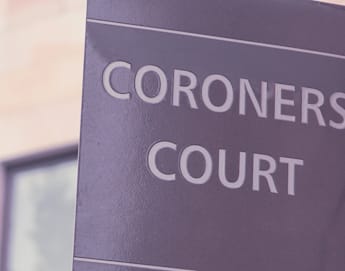- Coroners and Inquests
- What is an Inquest?
What is an Inquest?
Read on below to find out more information about inquests. If you would prefer to speak with one of our inquest solicitors call 0800 358 3848 or complete our online enquiry form.

What is an inquest?
The coroner will hold an inquest to establish the cause of an unexpected death (in cases where the death is unnatural or where the cause is unknown).
The coroner is in charge of the hearing and will call witnesses to give evidence and ask them to answer questions. Families and their legal representatives also have the opportunity to ask the witnesses questions. At the end of an inquest the Coroner will make findings as to what caused the death.
Although the Coroner does not say who is ‘at fault’, any verdict might be useful in a subsequent compensation claim - it might confirm a medical issue, or it may shed some light on facts surrounding the death that may not have surfaced otherwise.
Types of inquests
The Coroner will not investigate all deaths. However death resulting from an industrial disease such as the asbestos lung cancer and mesothelioma is deemed “unnatural” and in most cases the Coroner will begin an Inquest of his own accord.
What happens before, during and after the Inquest?
First, why an inquest?
In England and Wales the Coroner will hold an Inquest when he is notified of a death that was violent or unnatural or, in the case of a sudden death, where the cause is unknown.
The Coroner will not investigate all deaths. However death resulting from an industrial disease such as the asbestos cancer mesothelioma is deemed “unnatural” and in most cases the Coroner will begin (“open”) an Inquest of his own accord.
Sometimes the Coroner and the family will disagree as to whether an Inquest should be opened. In some cases it is possible to challenge a Coroner’s decision not to hold an Inquest. The family may be able to influence the question that the coroner asks or the evidence that he calls for. This is where legal representation can be very helpful.
The Timescale
Some Inquests can be concluded within a few weeks. If a Hearing is needed then this will probably take place a few months after the death, but each case is different.
There may be delay if someone has been charged with a criminal offence in connection with the death (e.g. murder/manslaughter).
Post Mortem Medical Examination
It is almost always the case that a Coroner who opens an Inquest will require a post-mortem examination.
The main exception is when the deceased was suffering from a well-diagnosed and advanced terminal condition.
In most cases a post mortem will help establish the cause of death. This could be relevant to any compensation claim.
It may be possible to obtain a post-mortem report at private expense if the Coroner has not already done so.
Asbestos Related Deaths
A post-mortem examination can provide new and unexpected medical information about the cause of death. That information may be relevant to any compensation claim.
If a claim has already begun or has been contemplated then it is essential that the Defendant (the person or company against who the claim is made) is informed of the death and is given the Coroner’s details as a matter of urgency.
If the Defendant is not given the opportunity to obtain and safeguard relevant medical information then the civil court might not allow any compensation claim to be made at all. This is especially true where lung cancer is involved.
Death Certificates
A death certificate will not normally be granted until the Inquest is finalised, although an “interim certificate of the fact of death” will normally be issued within a few days of the death.
This certificate should be accepted by banks, insurers, the Benefits Agency and others as proof of death so that bank accounts can be accessed, life insurance payments can be requested, direct debit payments for utilities and insurance be terminated and so on.
The Funeral
The funeral may be held once the Coroner releases the body.
The Coroner will normally allow burial or cremation once the examination of the body is complete, within a few days of the death, even though the Inquest process has only just begun.
Who's At Fault
It is not the Coroner’s role to establish who was at ‘fault’. Instead it is the Coroner’s role simply to establish what happened and to give his verdict accordingly. The Coroner can give a ‘short form’ verdict or a ‘narrative’ verdict.
Possible ‘short form’ verdicts are:
- neglect
- unlawful killing
- suicide
- attempted/self-induced abortion
- accident/misadventure
- natural causes
- industrial disease
- want of attention at birth
- drugs dependency
- open verdict
- lawful killing
After hearing the evidence, the coroner will give the jury a summary of the evidence and will tell them what verdicts are available in the light of that evidence. The jury will then deliver its verdict. Sometimes the Coroner will give a verdict himself.
A coroner may choose to give a ‘narrative’ verdict in which he will provide a clear and concise statement of events. This will be phrased neutrally but often provides more information than simply giving one of the ‘short-form verdicts’. When there is a Jury the coroner may invite them to answer factual questions. If the inquest shows that something could be done to prevent other deaths, the coroner may report this to the relevant organisation that has the power to take action. This is referred to as a “Rule 43 Report”.
Will there be a Public Hearing?
In some cases the Coroner will conduct an Inquest “on the papers” without a public hearing if he is satisfied about the medical cause of death and the surrounding circumstances.
For example, where someone has died in a hospice after suffering for a period from the asbestos cancer of mesothelioma then the Coroner might enter a verdict of “Death by Industrial Disease” without any hearing and perhaps without any Post Mortem examination.
Representation at a Hearing
Representation by lawyers at a hearing might raise issues or might uncover evidence which is valuable to the family. This might simply help the family understand what has happened. It might help avert similar deaths in the future. It might help in a later compensation claim.
Public funding (“Legal Aid”)is not generally available to cover representation at the inquest but there are exceptions. The costs of paying for representation may be recoverable if a later civil claim for damages is successful. We might act on a ‘no win no fee’ basis for the family or we might arrange pro bono (i.e. free) representation.
Media Coverage
All inquests must be held in public and someone from the press might be present in court. The coroner will make every effort to treat the family sympathetically and will often not read out personal notes or letters or display other sensitive evidence unless it is essential. The Coroner may warn the family before such evidence is produced to allow them to withdraw if they wish.
In some cases the person, company or organisation who is said to have caused the death might be present. They might give evidence. They may be represented by lawyers.
In some instances the family may want to publicise the inquest, and it is possible to prepare a press statement to give to journalists.
Conclusion
Although the Coroner does not say who is ‘at fault’, any verdict might be useful in a subsequent compensation claim - it might confirm a medical issue, or it may shed some light on facts surrounding the death that may not have surfaced otherwise.
For the family the Inquest may provide the first and possibly last opportunity to ask the right questions and to get some answers that will help them come to terms with what has happened.
Recent inquests
Our inquests experts
Our experienced team believes in putting clients first. We are dedicated to achieving the best results possible and pride ourselves on our sensitive approach. Any of our inquest solicitors below will be pleased to discuss your case and offer free advice over the phone.
-
Head of Personal Injury and Medical Negligence
Iona Meeres-Young
-
London, England
- 0330 460 6769
- Email Iona
-
-
Partner, Head of Serious Injury Sector
Jill Greenfield
-
London, England
- 0330 460 6778
- Email Jill
-
-
Partner, Head of Asbestos Claims
Peter Williams
-
Partner
Keith Barrett
-
London, England
- 0330 460 6783
- Email Keith
-
-
Partner
Mark Bowman
-
Partner
Jennifer Buchanan
-
London, England
- 0330 460 6774
- Email Jennifer
-
-
Partner
Ian Christian
-
London, England
- 0330 460 6514
- Email Ian
-
-
Partner
Bridget Collier
-
Manchester, England
- 0330 460 6740
- Email Bridget
-
-
Partner
Samantha Critchley
-
London, England
- 0330 460 6812
- Email Samantha
-
-
Partner
Keith Cundall
-
Manchester, England
- 0330 460 7381
- Email Keith
-
-
Partner
Nick Godwin
-
London, England
- 0330 460 7204
- Email Nick
-
-
Partner
Julia Hamilton
-
Manchester, England
- 0330 460 6780
- Email Julia
-
-
Partner
Lindsay Holt
-
Manchester, England
- 0330 460 6789
- Email Lindsay
-
-
Partner
Claire Horton
-
Manchester, England
- 0330 460 6748
- Email Claire
-
-
Partner
Paul McNeil
-
Partner
Dushal Mehta
-
Partner
Andrew Morgan
-
Partner
Shaheen Mosquera
-
London, England
- 0330 460 6817
- Email Shaheen
-
-
Partner
Shivi Nathan
-
London, England
- 0330 460 7160
- Email Shivi
-
-
Partner
Kate Rohde
-
London, England
- 0330 460 6781
- Email Kate
-
-
Partner
Arti Shah
-
London, England
- 0330 460 6739
- Email Arti
-
-
Partner
Helen Thompson
-
London, England
- 0330 460 6765
- Email Helen
-
-
Partner
Jenny Urwin
-
Manchester, England
- 0330 460 6776
- Email Jenny
-
-
Partner
Jane Weakley
-
London, England
- 0330 460 6773
- Email Jane
-
-
Partner
Jonathan Zimmern
-
London, England
- 0330 460 6779
- Email Jonathan
-
-
Director
Marcos Eleftheriou
-
London, England
- 0330 460 6352
- Email Marcos
-
-
Director
Claire Glasgow
-
London, England
- 0330 460 6747
- Email Claire
-
-
Director
Caron Heyes
-
London, England
- 0330 460 6743
- Email Caron
-
-
Director
Will Jones
-
London, England
- 0330 460 6822
- Email Will
-
-
Director
Harvinder Kaur
-
London, England
- 0330 460 6762
- Email Harvinder
-
-
Director
Deborah Nadel
-
London, England
- 0330 460 6750
- Email Deborah
-
-
Director
Punam Sood
-
London, England
- 0330 460 5952
- Email Punam
-
-
Senior Associate
Sevim Ahmet
-
Senior Associate
Suzanne Farg
-
London, England
- 0330 460 6819
- Email Suzanne
-
-
Senior Associate
Christina Gardiner
-
London, England
- 0330 460 6746
- Email Christina
-
-
Senior Associate
Emma Kendall
-
London, England
- 0330 460 6755
- Email Emma
-
-
Senior Associate
Rachel Morgan
-
London, England
- 0330 460 6608
- Email Rachel
-
-
Senior Associate
Nilam Patel
-
London, England
- 0330 460 6801
- Email Nilam
-
-
Associate
Lewis Ayre
-
London, England
- 0330 460 6788
- Email Lewis
-
-
Associate
Adam Curry
-
London, England
- 0330 460 6367
- Email Adam
-
-
Associate
Rebecca Drew
-
Associate
Libby Ferrier
-
London, England
- 0330 460 7178
- Email Libby
-
-
Associate
Gabriella Gooday
-
London, England
- 0330 460 6758
- Email Gabriella
-
-
Associate
Jamie Green
-
London, England
- 0330 460 6771
- Email Jamie
-
-
Associate
Emma Hall
-
London, England
- 0330 460 6754
- Email Emma
-
-
Associate
Eman Hassan
-
London, England
- 0330 460 6753
- Email Eman
-
-
Associate
Sarah Kingsley Fried
-
London, England
- 0330 460 6815
- Email Sarah
-
-
Associate
Carley Ross
-
London, England
- 0330 460 6838
- Email Carley
-
-
Associate
Jack Sales
-
London, England
- 0330 460 7328
- Email Jack
-
-
Associate
Gemma Wells
-
London, England
- 0330 460 6549
- Email Gemma
-
-
Solicitor
Natalie Amara
-
London, England
- 0330 460 7113
- Email Natalie
-
-
Solicitor
Louise Astill
-
London, England
- 0330 460 6147
- Email Louise
-
-
Solicitor
Abby Bennett
-
London, England
- 0330 460 7342
- Email Abby
-
-
Solicitor
Heidi Brotherton
-
Manchester, England
- 0330 460 6763
- Email Heidi
-
-
Solicitor
Francesca Farrelly
-
Manchester, England
- 0330 460 5917
- Email Francesca
-
-
Solicitor
Mona Gholami
-
London, England
- 0330 460 6752
- Email Mona
-
-
Solicitor
Jennifer Kelly
-
London, England
- 0330 460 6775
- Email Jennifer
-
-
Solicitor
Francesca Krauze
-
London, England
- 0330 460 6512
- Email Francesca
-
-
Solicitor
Mikhail Popov
-
London, England
- 0330 460 7236
- Email Mikhail
-
-
Solicitor
Harriet Salvesen-Sawh
-
London, England
- 0330 460 6761
- Email Harriet
-
-
Solicitor
Satvir Sokhi
-
London, England
- 0330 460 7393
- Email Satvir
-
-
Solicitor
Ella Thornton
-
Manchester, England
- 0330 460 7214
- Email Ella
-
-
Solicitor
Charlotte Thorpe
-
Legal Executive
Henry Kirwan
-
London, England
- 0330 460 6766
- Email Henry
-
-
Chartered Legal Executive
Marlena Mistak
-
London, England
- 0330 460 6795
- Email Marlena
-
-
Paralegal
Ronan Ballance
-
Manchester, England
- 0330 460 7018
- Email Ronan
-
-
Solicitor Apprentice
Jess Gurzynski
-
London, England
- 0330 460 6777
- Email Jess
-
-
Solicitor Apprentice
Amba Minhas
-
London, England
- 0330 460 7124
- Email Amba
-
Recent news and insights
Contact us
For a free, no obligation call with one of our inquest solicitors, please dial 0800 358 3848 or complete our online enquiry form.












































































































